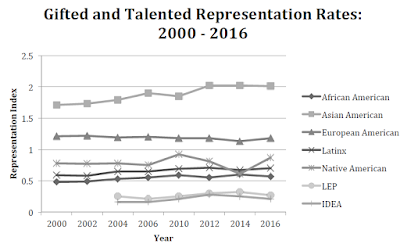We Must "Walk the Talk"
Decade after decade, it is the same story. It is true that segregation is no longer dictated by law, but it is now indirectly enforced by housing prices, school programs, and zoning policies. We have candidates for school boards who appear to be championing equity in our schools. The sad bottom line, however, is that things have hardly changed. In "Who Gets Served in Gifted Education? Demographic Representation and a Call for Action", it is clear that the under-representation of low-income children, English language learners, students with disabilities, Blacks, and Hispanics in advanced academic programs persists.
And the state of Virginia is no exception:
In Virginia, Asian American children are seven times more likely to be identified as gifted or advanced than a child considered either as an English language learner or as a child with learning disabilities. It is also guaranteed that this disparity really draws a line based on family income.
The stubbornness stems not from a lack of desire for equity but from an obstinate addiction to labeling our children as "smart". We already know that identification for advanced academic programs is biased toward a child's background yet we continue to practice segregation based on background. Privilege determines which child will receive a tag of being "advanced". In the United States, money can buy learning opportunities especially for young children. Yet, we still equate "gifted" with "having money".
The fact that things have not changed throughout the years amidst numerous voices championing for equity in education means only one things. We simply have not "walked the talk".
 |
| Above copied from Peters, S. J., Gentry, M., Whiting, G. W., & McBee, M. T. (2019). Who Gets Served in Gifted Education? Demographic Representation and a Call for Action. Gifted Child Quarterly. https://doi.org/10.1177/0016986219833738 |
And the state of Virginia is no exception:
In Virginia, Asian American children are seven times more likely to be identified as gifted or advanced than a child considered either as an English language learner or as a child with learning disabilities. It is also guaranteed that this disparity really draws a line based on family income.
The stubbornness stems not from a lack of desire for equity but from an obstinate addiction to labeling our children as "smart". We already know that identification for advanced academic programs is biased toward a child's background yet we continue to practice segregation based on background. Privilege determines which child will receive a tag of being "advanced". In the United States, money can buy learning opportunities especially for young children. Yet, we still equate "gifted" with "having money".
The fact that things have not changed throughout the years amidst numerous voices championing for equity in education means only one things. We simply have not "walked the talk".

Comments
Post a Comment